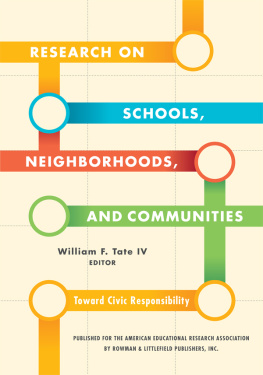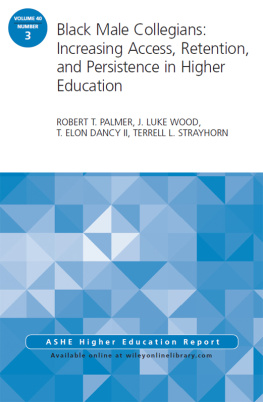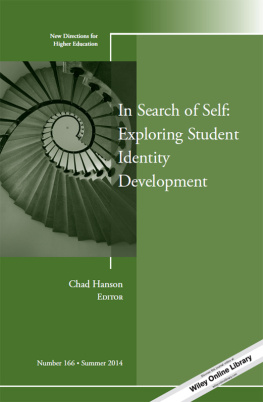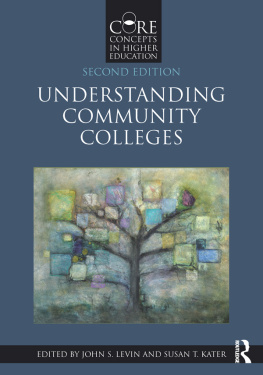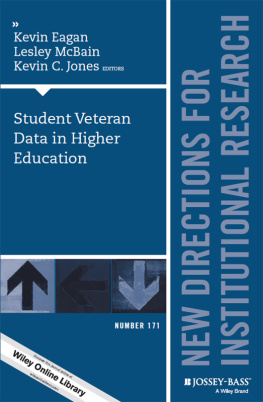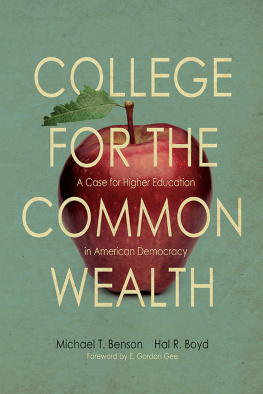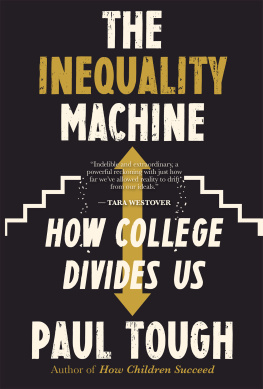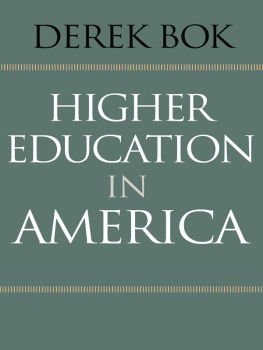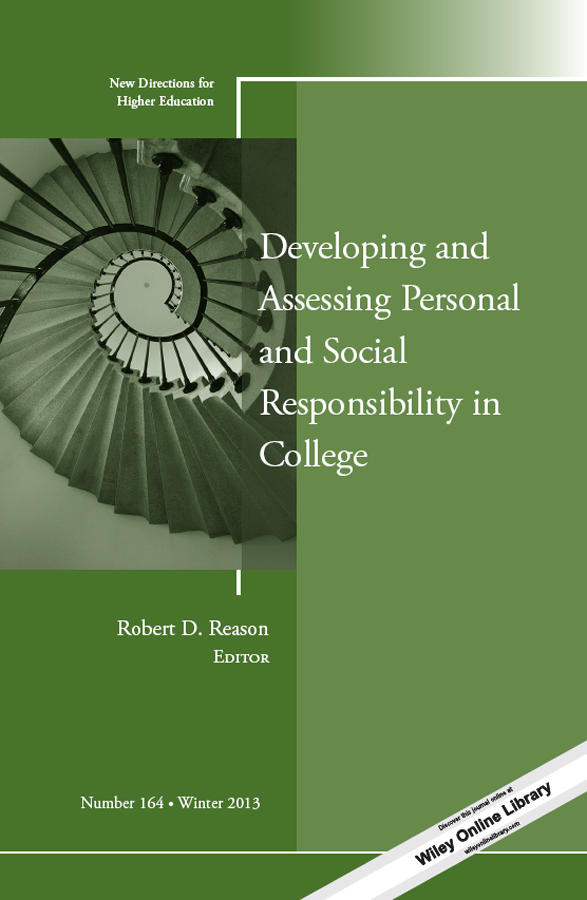Contents

Developing and Assessing Personal and Social Responsibility in College
Robert D. Reason
New Directions for Higher Education, no. 164
Betsy O. Barefoot and Jillian L. Kinzie , Co-editors
Copyright 2013 Wiley Periodicals, Inc., A Wiley Company. All rights reserved. No part of this publication may be reproduced in any form or by any means, except as permitted under sections 107 and 108 of the 1976 United States Copyright Act, without either the prior written permission of the publisher or authorization through the Copyright Clearance Center, 222 Rosewood Drive, Danvers, MA 01923; (978) 750-8400; fax (978) 646-8600. The copyright notice appearing at the bottom of the first page of a chapter in this journal indicates the copyright holders consent that copies may be made for personal or internal use, or for personal or internal use of specific clients, on the condition that the copier pay for copying beyond that permitted by law. This consent does not extend to other kinds of copying, such as copying for general distribution, for advertising or promotional purposes, for creating collective works, or for resale. Such permission requests and other permission inquiries should be addressed to the Permissions Department, c/o John Wiley & Sons, Inc., 111 River Street, Hoboken, NJ 07030; (201) 748-6011; fax (201) 748-6008; www.wiley.com/go/permissions .
Microfilm copies of issues and articles are available in 16mm and 35mm, as well as microfiche in 105mm, through University Microfilms Inc., 300 North Zeeb Road, Ann Arbor, MI 48106-1346.
New Directions for Higher Education (ISSN 0271-0560, electronic ISSN 1536-0741) is part of The Jossey-Bass Higher and Adult Education Series and is published quarterly by Wiley Subscription Services, Inc., A Wiley Company, at Jossey-Bass, One Montgomery Street, Suite 1200, San Francisco, CA 94104-4594. POSTMASTER: Send address changes to New Directions for Higher Education, Jossey-Bass, One Montgomery Street, Suite 1200, San Francisco, CA 94104-4594.
New Directions for Higher Education is indexed in Current Index to Journals in Education (ERIC); Higher Education Abstracts.
Individual subscription rate (in USD): $89 per year US/Can/Mex, $113 rest of world; institutional subscription rate: $311 US, $351 Can/Mex, $385 rest of world. Single copy rate: $29. Electronic onlyall regions: $89 individual, $311 institutional; Print & ElectronicUS: $98 individual, $357 institutional; Print & ElectronicCanada/Mexico: $98 individual, $397 institutional; Print & ElectronicRest of World: $122 individual, $431 institutional.
Editorial correspondence should be sent to the Co-editor, Betsy O. Barefoot, Gardner Institute, Box 72, Brevard, NC 28712.
Cover photograph Digital Vision
www.josseybass.com
Editors Notes
In an open letter to her students, Melissa Harris-Perry, MSNBC television host and Tulane University professor of political science, suggested that voting was the citizenship equivalent of brushing your teeth: I am glad you do it regularly, but I am hardly going to applaud you for achieving such a minimal responsibility (2011, para. 1). Unfortunately, voting behavior is often the primary outcome in research and writing related to civic learning and democratic engagement. This attention on voting casts an overly narrow scope on what it means to be an active and engaged member of a democracy.
The Association of American Colleges and Universities (AAC&U) began the Core Commitments Initiative in 2007, long before Dr. Harris-Perry likened voting to toothbrushing but for similar reasons: AAC&U saw the need to expand the conversation among higher educators to include more than simply voting behaviors. The Core Commitments Initiative focused the discussion on the broader concept of personal and social responsibility (PSR) with the understanding that such a focus would not only be more inclusive but also return higher education in the United States to its historical roots. Expanding the conversation to emphasize PSR leaves room for behavioral measures, like voting or hours spent in community service, and also opens our understanding of citizenship to include issues of civic identity, civic attitudes, personal integrity, and ethics. This broader conceptualization is the focus of this volume.
This volume explores the research and practice related to PSR as an outcome of college, focusing intentionally on how institutions can facilitate the development of PSR in the students enrolled in their institutions. After this short introductory preface, the first four chapters lay the foundation upon which the good practice chapters that follow are built. These chapters address the theoretical rationales for including PSR as an intentional outcome of college, the existing empirical research that suggests good practices, and the issues associated with assessing PSR. This initial section focuses on creating a sense of institutional pervasiveness (a campus climate) that encourages student development of PSR.
Caryn McTighe Musil, a senior scholar and director of Civic Learning and Democracy Initiatives at AAC&U, provides a theoretical and philosophical justification for AAC&Us focus on personal and social responsibility.
In Chapter 2, Robert D. Reason, Andrew J. Ryder, and Chad Kee review the existing empirical literature related to PSR, answering two broad questions: why educate for PSR and what are the challenges to educating for PSR. The authors also use the existing empirical research to link education for PSR to other important outcomes of higher education, making the case for the importance of studying PSR. This literature review lays the foundation for a greater understanding of how colleges and universities can influence the development of PSR among their studentsthe themes of the final three chapters in this volume.
In Chapter 3, Carol Trosset, of Bennington College, challenges higher educators and higher education researchers to think more broadly about PSR. Trosset argues that even with AAC&Us broad definition of PSR, the existing literature is overly focused on those behaviors that most logically would be categorized as social responsibility , practically ignoring more personal forms of responsibility. Trosset calls on researchers to include more emphasis on academic integrity and fulfilling ones personal responsibilities in family and work situations to our research agendas.
Chapter 4, by Andrew J. Ryder and Joshua J. Mitchell, moves the conversation to focus on issues of assessment related to PSR, specifically emphasizing issues related to assessing learning climates but including other outcome measures. This chapter introduces the Personal and Social Responsibility Inventory (PSRI) and serves as a bridge to focusing on what has been learned from the work of the Core Commitments Initiative. The PSRI is a climate assessment that emerged from the work of the Core Commitments Initiative and is available for institutional use through Iowa State Universitys Research Institute for Studies in Education.
The succeeding chapters build upon the work of higher education institutions that participated in the AAC&Us Core Commitments Initiative. These chapters interweave examples drawn from the experiences of these institutions to address good practices meant to intentionally infuse PSR in coursework and the cocurriculum. Each chapter highlights those practices that integrate curricular and cocurricular experiences in a holistic approach to the development of PSR. A final chapter in this section addresses how administrators can remove institutional obstacles to the infusion of PSR into the institutional ethos.


